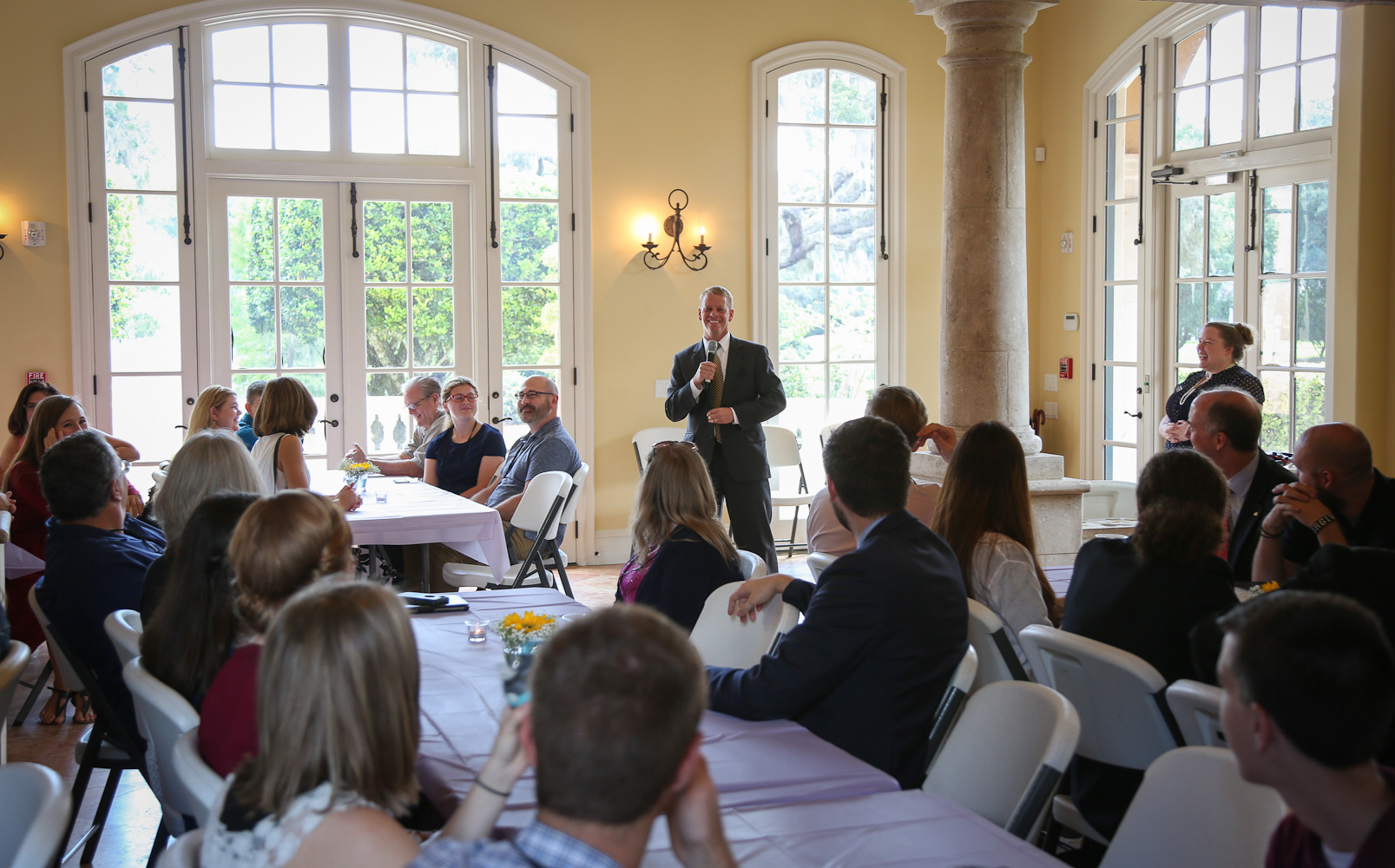2016 Fall Conference and Preview Week
Posted On September 21, 2016
Reformation Bible College welcomed prospective students and their families for its Fall Preview Weekend on September 14–16. The Preview Weekend was part of the 2016 Fall Conference at RBC, which featured Drs. R.C. Sproul, R. Albert Mohler, Stephen J. Nichols, and R.C. Sproul Jr. as speakers. Prospective students came from all over the country to get a sense of what makes RBC unique. As part of this experience, they and their families toured the RBC campus, sat in on classes, and interacted with professors and current students.
Previewers also sat in on RBC’s weekly chapel service, in which Dr. David Powlison, executive director for Christian Counseling and Educational Foundation (CCEF) and senior editor of the Journal of Biblical Counseling, taught from Philippians 4:6 on dealing with anxiety. He reminded the student body that even though so much is out of our control in this world, we must not forget who is in control—we need not have to be afraid, because God is near.
In the afternoon, the prospective students attended classes while their parents and guests learned more about RBC and the admissions process. The day ended with Abide, RBC’s student-led fellowship group.
The Ligonier Fall Conference at RBC began on Friday. The sessions addressed how God was working in the years preceding the Protestant Reformation. Dr. Mohler reflected on the importance of looking at these years, noting that without the theological happenings of 1516, we would not have had the same 1517.
Dr. Mohler was then joined by Dr. R.C. Sproul for a time of questions and answers. They discussed problems in the modern church, the importance of church history, and the need for reform-minded individuals in the church, among other topics.
Dr. Nichols opened the conference on Saturday morning by drawing a parallel between church history and the early-morning sky. The darkest and coldest moment is that moment just before the dawn, and it is during this time that the “morning star” shines, signaling that morning is near. God provided several individuals who paved the way for the Protestant Reformation, who shone brightly in the darkness of the Roman Catholicism’s teachings about man, Christ, and the sacraments.
Dr. Sproul Jr. then taught on Genesis 3:14–15, showing the growth of Pelagianism in church history and how a “mini-Pelagian” can creep into the hearts of all mankind. He then noted that all of history points to and finds purpose in Christ—that He is the ultimate sacrifice. Finally, Dr. Sproul Jr. asserted that the distortion of the result of Christ’s work (salvation) was the reason for the Reformation—it was the need for correct soteriology. A Q&A session followed Dr. Sproul’s message, dealing with living the Christian life and the nature of Christ and His work.
 During the lunch break, RBC faculty joined the previewers for a Q&A session that focused on the question “Why choose RBC?” Dr. Nichols pointed out, “You don’t come to RBC for the sports team or dorm rooms or cafeteria; you come for the faculty.” At Reformation Bible College, theology meets reality. If our first vocation is to glorify God, then this is the boot camp for life. John W. Tweeddale, academic dean and professor of theology, said, “We want students to leave this place with a greater love for God then when they began,” and Dr. Sproul Jr. added, “The RBC experience is about soul searching and sanctification.” Time spent at RBC provides knowledge to further the kingdom and preparation for being faithful in the little things. To know God above all is the goal and worship is the result.
During the lunch break, RBC faculty joined the previewers for a Q&A session that focused on the question “Why choose RBC?” Dr. Nichols pointed out, “You don’t come to RBC for the sports team or dorm rooms or cafeteria; you come for the faculty.” At Reformation Bible College, theology meets reality. If our first vocation is to glorify God, then this is the boot camp for life. John W. Tweeddale, academic dean and professor of theology, said, “We want students to leave this place with a greater love for God then when they began,” and Dr. Sproul Jr. added, “The RBC experience is about soul searching and sanctification.” Time spent at RBC provides knowledge to further the kingdom and preparation for being faithful in the little things. To know God above all is the goal and worship is the result.
After the lunch, Dr. Nichols introduced the Ligonier Statement on Christology. He worked through the book of Hebrews, addressing key christological themes and points throughout the text.
To close the conference, Dr. Sproul Jr. spoke on the message of repentance behind Martin Luther’s Ninety-Five Theses. In the context of Luther’s intense knowledge and hatred of his guilt before God, Dr. Sproul Jr. applied the parable of the tax collector and the Pharisee to sixteenth-century Roman Catholicism, pointing to the great necessity for a proper view of justification. He concluded by noting that Luther’s first thesis speaks of the Christian life as living “all of our life in repentance.”







